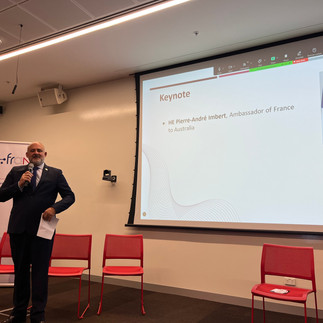FAR 2025 - Children and Screens - A summary
- afranorg
- Jul 15, 2025
- 4 min read
Updated: Jul 16, 2025
Held between Sydney and Paris, the 2025 edition of FAR (French-Australian Research) brought together leading voices to address one of the most urgent and complex challenges of our time: how to better protect, support, and empower children in the digital world. Over three dynamic panels, researchers, policymakers, educators, legal experts, and law enforcement professionals explored the opportunities and dangers that digital technologies pose to younger generations—and the collective responsibility we share to act.
Opening the event, Dr Jocelyne Basseal (University of Sydney) and Dr Kimberley Coulson (AFRAN) set the tone for the day. They called for renewed French-Australian collaboration grounded in science, ethics, and lived experience. Kimberley, speaking as both a policy advisor and new mother, reflected on the personal dilemmas families face, while Jocelyne underscored the need to combine high-level research with actionable policy. Both emphasized that young people must be involved—not just studied—when designing the digital future.
H.E. Pierre-André Imbert, Ambassador of France to Australia, followed with a clear message: the challenges of the digital age are global, and protecting children is a shared moral and political duty. He praised the FAR initiative for connecting science, policy, and international cooperation, and framed the forum as a powerful starting point for joint solutions.
Panel 1: Children in the Digital World – Risks and Benefits
Moderated by Prof Andrew Campbell, the first panel opened with direct input from young people, whose testimonies revealed thoughtful concerns about misinformation, screen overuse, and body image pressures—but also a desire to use digital tools responsibly. Their insights were co-produced through projects like the Australia-Pacific Youth Partnership and work at Lycée Condorcet.
Professor Amine Benyamina, Chair of the French Presidential Commission on Children and Screens, laid out the Commission’s findings: clear risks related to sleep, vision, physical inactivity, mental health, and exposure to harmful content. He stressed the need for regulation, media literacy, and a new cultural approach to screens.
From New Caledonia, Dr Olivier Galy shared health-focused interventions tailored to adolescents, while Professor Corinne Caillaud (University of Sydney) expanded on youth-led projects in the Pacific. Dr Rebecca Raeside introduced Health for Me, a co-designed text-messaging intervention promoting adolescent well-being. Kristy Thomson (Australian Federal Police) presented Think U Know, a national cyber-safety program aimed at prevention and education. Dr Alexis Whitton (Black Dog Institute) demonstrated how digital mental health tools like Sleep Ninja can expand access to care when grounded in robust research. The panel collectively emphasized: screens are here to stay—what matters is how we guide young people in using them.
Panel 2: AI and Digital Tools in Education
Moderated by Dr Hannah Feldman (Australia National University), the second panel explored how generative AI and digital tools are reshaping classrooms and challenging educators. Student contributions revealed that AI is already part of their daily study routines—from summarizing texts to translating and brainstorming ideas—raising questions about fairness, autonomy, and assessment.
Sarah Vallée, a specialist in digital ethics and AI policy, emphasized that educational AI tools must meet high standards of transparency, safety, and accountability—especially under the EU AI Act. Sarina Wilson (NSW Department of Education) presented EduChat, a purpose-built AI chatbot designed to support student learning through questioning rather than shortcuts.
Dr Clara Sitbon (University of Sydney) and Christel Izak (New Caledonia Department of Education) demonstrated how AI is being used in French language instruction, while Dr Hisaé Giraud (ISA, New Caledonia) explained the benefits of AI in supporting neurodivergent learners, especially autistic students. Nicolas L’Hotellier, Principal of Lycée Condorcet Sydney, gave a frontline view of what AI policy looks like in a multilingual, multi-framework school, calling for more support and consistency for teachers. The panel agreed: AI’s impact will be determined by how thoughtfully it’s implemented—pedagogy must remain at the center.
Panel 3: Regulation on children’s access to screens and media
Chaired by Gregory Cornillon, this panel examined how law and policy can better regulate children’s digital environments. Adrien Taquet, former French Secretary of State for Children, opened with France’s twin strategy: clear legal thresholds (such as banning screen use under age 3 and social media under 15) and public education to empower parents and professionals. But bans, he warned, must come with support.
Australian Senator Sarah Hanson-Young called out the core issue: platforms profit from children’s attention, and their design is built around addiction and surveillance. She advocated for a “duty of care” model and tighter oversight of algorithms. MP Zoe McKenzie added that parliamentary inquiries have already begun shifting industry behavior, citing Instagram Teens as an example. She called for increased transparency, researcher access to platform data, and more cross-border alignment on standards.
Dr Tanja Petelin (University of Poitiers) offered a legal lens, outlining how the EU’s Digital Services Act protects minors’ rights while upholding their autonomy. Xavier Delporte (CNIL – France’s Data Protection Authority) revealed findings from a national study showing teens are digitally savvy but often unaware of how their data is used. Dr Louisa Peralta (University of Sydney) shared insights from the Pacific and Australia, where young people themselves are asking for better guidance, not just restrictions. Professor Colin MacDougall pushed for youth involvement in all stages of policy design. Sophie Bazard, cybercrime officer with the French Ministry of Interior, delivered a sobering message on the rise of online child sexual abuse and the need for responsible adult behavior—starting with not sharing children’s images online.
What Comes Next
Across all three panels, a common theme emerged: the question is not whether children will engage with digital tools, but whether we—as adults, institutions, and societies—will equip them to do so safely, critically, and ethically.
FAR 2025 demonstrated that effective responses require coordinated action—between countries, sectors, and generations. It showed the power of putting science in conversation with public responsibility, and youth voices at the center of the debate.
This is just the beginning. A FAR 2025 White Paper is now in development, synthesizing key insights and outlining a shared roadmap for future French-Australian collaboration on children and digital technologies. Stay tuned.
You'll find programs and bios on the event page

![[REPORT] Women in AI: How are we championing inclusive and sustainable AI?](https://static.wixstatic.com/media/d57139_8b06834fe8024a66a8222df7325eaeb4~mv2.png/v1/fill/w_447,h_250,fp_0.50_0.50,q_35,blur_30,enc_avif,quality_auto/d57139_8b06834fe8024a66a8222df7325eaeb4~mv2.webp)
![[REPORT] Women in AI: How are we championing inclusive and sustainable AI?](https://static.wixstatic.com/media/d57139_8b06834fe8024a66a8222df7325eaeb4~mv2.png/v1/fill/w_102,h_57,fp_0.50_0.50,q_95,enc_avif,quality_auto/d57139_8b06834fe8024a66a8222df7325eaeb4~mv2.webp)






















Comments